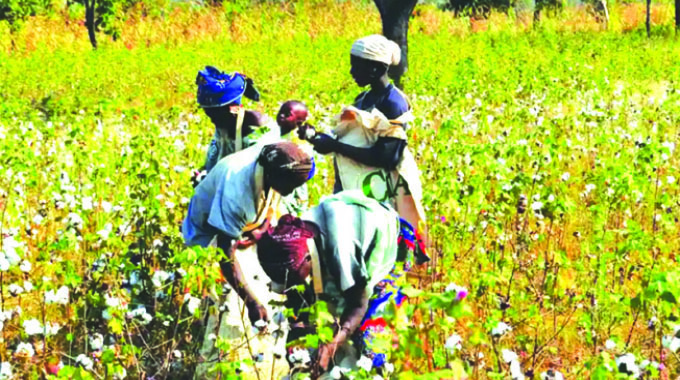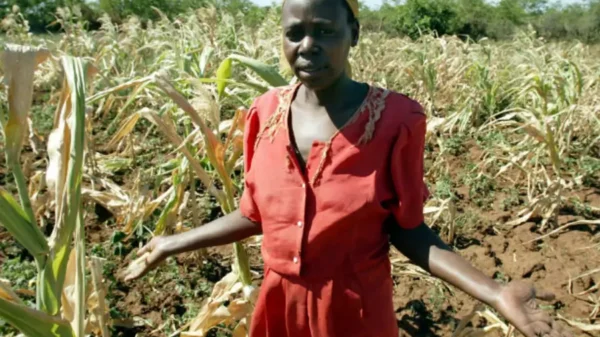The effects of El Niño drought are tightening their grip on Zimbabwe’s rural communities, forcing desperate farmers to sell off their prized livestock – primarily goats and cattle– to abattoirs, butcheries and middlemen at heavily discounted prices.
El Niño, a phenomenon, characterised by unusually warm ocean temperatures in the Pacific, disrupts rainfall patterns and often leading to drier conditions–has triggered drought fears in Zimbabwe and southern Africa, threatening food prices and inflation.
Livestock are vital sources of income for rural households in Zimbabwe and critical for their sustenance.
Several peasant farmers in Sanyati District in Mashonaland West Province, Gokwe North and South in the Midlands Province told The Herald Finance & Business that they were offloading their cattle, goats and sheep for a fraction of their usual value, as farmers seek to buy food to feed their families.
According to the farmers, abattoirs, private butcheries and middlemen are capitalising on the desperate situation, offering prices significantly lower than what farmers would typically receive during normal seasons.
For instance, cattle, which normally fetch between US$300 and US$500, are now being sold for US$150 to US$200.
Similarly, the price of goats has plummeted from US$35-40 in normal seasons to a meagre US$12 to US$15.
In a bid to bypass the exploitative middlemen, some farmers are aggregating their livestock to sell directly to the final buyers. However, their net earnings are significantly eroded when transportation costs are factored in.
Some buyers are bartering for livestock, offering mealie-meal or grain maize instead of cash. For instance, they are offering a 10kg pack of maize meal or three gallons of grain maize in exchange for a goat.
Adding to their woes, the drought has delivered a double blow by devastating the cotton crop. Traditionally, these communities rely on proceeds from cotton sales to buy food, particularly maize, which rarely thrives due to the dry conditions.
With the cotton harvest almost likely to fail due to El Nino induced drought, farmers have lost their critical source of income, further exacerbating their dependence on selling their livestock at deeply discounted prices.
The mass destocking, while necessary for short-term survival, could have long-term consequences for rural livelihoods.
“We last received the rains in early January,” said Mr Zvidzai Chaparadza, a farmer and councilor for Ward 34 in Gokwe North District, echoing the despair of many villagers. “The maize crop, which we normally gamble with totally failed this time due to drought and cotton has not been spared leaving, us without our usual sources of income to buy food and meet other household requirements.
“What is now happening is that people are coming from Gokwe (business center) and Harare to buy goats and cattle and are taking advantage of the situation to pay substantially low prices,” added Mr Chiparadza, whose jurisdiction is 323 villages, each with an average of 20 households.
Rebuilding herds when the drought breaks will be a slow and arduous process, leaving many families vulnerable for years to come.
Mr Chiparadza noted that livestock was a pillar of wealth for many rural households in Zimbabwe, now being eroded “for a pittance.”
While some farmers are attempting to bypass exploitative middlemen by selling directly to final buyers, the benefits are minimal due to exorbitant transportation costs.
As Tavaziva Munherendi, a farmer in Sanyati pointed out, “transport costs are too high and sometimes leave farmers with just US$12 to $15 for a goat, significantly eroding any potential profit.”
This means that even selling directly offers little financial relief.
A headman in Simchembo, Zhomba, popularly known as Chitekete, Siyabuwa Kafunde recounted his experiences and described the “profiteering behavior” of the butchery officials as a mockery to the villagers.
“They came (the dealers) looking for goats to buy and offered me US$12 per herd or two 10 kg of mealie meal. I told them that I would rather slaughter my goats and feed my family,” he said.
A livestock dealer based at Gokwe Business Center told this publication that they were making “good business due to a desperate situation.”
“It is time for us to make money,” the dealer, who declined to be named, bragged.
The Competition and Tariff Commission (CTC) has said it is taking a proactive stance against potential anti-competitive practices in the wake of the adverse effects of the El Niño weather phenomenon.
Sectors most vulnerable to drought conditions, such as agriculture and essential goods suppliers, may be tempted to engage in price gouging, a practice that involves unfairly raising prices to capitalise on scarcity and consumer desperation.
The practice places a heavy burden on consumers, particularly low-income households.
However, the informal nature of some businesses can make it difficult for the CTC to monitor them effectively. Limited accessibility to rural areas can also hinder the CTC’s ability to gather evidence and enforce regulations.
Meanwhile, a nationwide challenge looms as the Government urges rural communities to destock non-productive animals to minimise potential drought losses.
Mr Wisdom Gunzvenzve, a specialist with the Ministry of Lands, Agriculture, Fisheries, Water and Rural Development’s department of livestock production and development has advised farmers to destock their herds by selling non-productive animals. This difficult but necessary step can help mitigate potential losses caused by dwindling water and grazing resources.
“We don’t want farmers to lose their animals. They should take the option of destocking during this time of drought.
“When we talk of productive animals we are talking of breeding animals, heifers, and cows. We also have animals we use for draught power. It is advisable to destock and we save only productive animals,” he said.
He said the money realised through destocking could be used to buy feed for the remaining animals or drilling of boreholes on farms and in communities.
“Sometimes livestock farmers fail to realise how rich they are in terms of conversion of livestock into monetary terms.
There are things they are able to do on their own while the Government continues to save the livestock sector,” he said.
For comments, Feedback and Opinions do get in touch with our editor on WhatsApp: +27 82 836 5828






